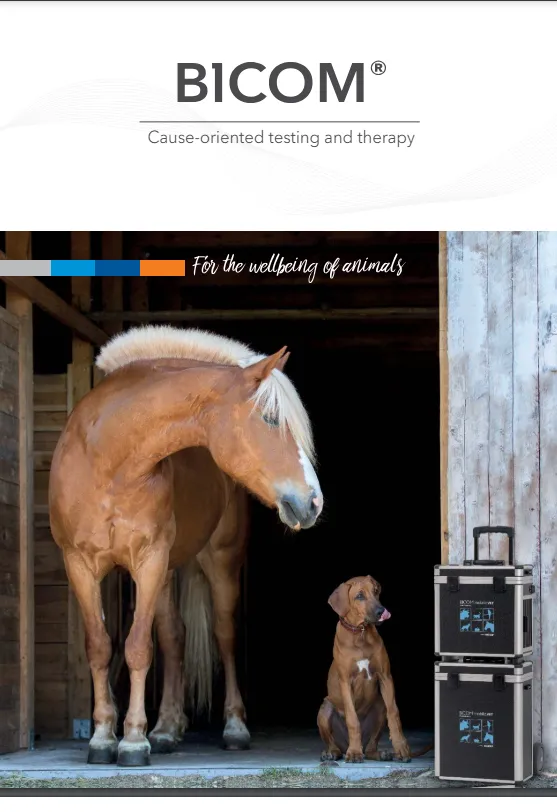BICOM® Bioresonance
Stress-free for pets and pet owners Suitable for all types of animals
There are many dogs , cats and horses suffering from health problems worldwide.
Be it problems with the musculoskeletal system, allergies and food intolerances or chronic diseases.
Sometimes, as an animal owner, you are at a loss when you can’t get any further with conventional therapy methods.
Like acupuncture or homeopathy, bioresonance belongs to the field of complementary medicine and is intended to be a useful supplement to conventional medicine.
It works with the body’s own wavelength of the four-legged friend, is used without medication and is painless to use.
Of course, not all health problems can be resolved with bioresonance. It is best to talk to a veterinarian or animal naturopath.
With our therapist finder you can find the nearest practice that can offer you BICOM® bioresonance.
Pain-free testing and therapy
Treatment with the BICOM® device is painless and stress-free. Especially sensitive animals feel very comfortable and it often happens that they completely relax and come to rest during the therapy.
Bioresonance has no harmful side effects and is used without medication.
Occasionally, initial aggravations, in what is known as the body’s initial reaction, can occur. However, these fade away after a short time.
What Pet Owners are saying..

Bioresonance Therapy Near Me – Natural Healing
How Bioresonance Therapy Near Me Can Improve Your Health Naturally
The search for alternative healing methods has led many people to explore bioresonance therapy near me as a safe and effective option. This non-invasive treatment is gaining popularity for addressing various health concerns, from chronic pain to digestive disorders. With more people looking for drug-free solutions, bioresonance therapy offers a promising approach that focuses on restoring the body's natural balance. But how does it work, and is it truly effective? Let’s explore the science behind it and how it can benefit your overall well-being.
What Is Bioresonance Therapy?
Bioresonance therapy is a holistic treatment based on the principle that every cell in the human body emits electromagnetic waves. These waves carry information that reflects the body’s current state. When a person is in good health, the frequency patterns remain balanced. However, exposure to stress, toxins, infections, and other harmful factors can disrupt these frequencies, leading to physical and emotional imbalances.
Bioresonance therapy aims to detect and correct these imbalances using specialized devices. These machines analyze the body's electromagnetic signals and send corrective frequencies to neutralize disruptions. This process is believed to support the body's self-healing ability, helping to restore optimal health over time.
How Does Bioresonance Therapy Work?
Bioresonance therapy operates through a three-step process:
1. Frequency Detection: A bioresonance device scans the body to detect abnormal frequencies caused by toxins, infections, or cellular imbalances.
2. Corrective Signal Transmission: The device then emits counter-frequencies to neutralize these disruptions and help the body restore its natural state.
3. Self-Regulation and Healing: Over time, the body starts to regulate itself more efficiently, leading to improved health and overall well-being.
During a session, electrodes or magnetic coils are placed on the skin to allow the device to read and modify the body's frequencies. The process is painless and does not require medication, making it a preferred choice for individuals seeking a non-invasive treatment.
Scientific Perspective on Bioresonance Therapy
The effectiveness of bioresonance therapy remains a subject of scientific debate. While some medical professionals remain skeptical, several studies have explored its potential benefits.
Research suggests that electromagnetic frequency therapy may support the body’s detoxification process, reduce inflammation, and improve immune function. Some studies indicate that bioresonance can be beneficial for allergies, digestive disorders, and pain management. A review of alternative medicine approaches found that patients who used bioresonance therapy reported reduced symptoms and improved overall health.
Although more extensive clinical studies are needed, many patients have shared positive experiences, highlighting the potential of bioresonance therapy in improving well-being.
Key Health Benefits of Bioresonance Therapy
People searching for bioresonance therapy near me often suffer from unresolved health issues. This therapy offers a natural way to support the body’s healing mechanisms. Here are some of its key benefits:
1. Pain Relief for Chronic Conditions
Bioresonance therapy is commonly used to manage pain from conditions such as arthritis, migraines, and fibromyalgia. By addressing underlying imbalances, it may help reduce inflammation and discomfort.
2. Allergy and Asthma Management
Many individuals with allergies and asthma seek bioresonance therapy to regulate their immune responses. It is believed to help the body become less reactive to allergens, leading to fewer symptoms and improved respiratory health.
3. Detoxification and Toxin Removal
The body is constantly exposed to toxins from processed foods, pollution, and chemicals. Bioresonance therapy is thought to support the liver and kidneys in eliminating these harmful substances, improving energy levels and overall wellness.
4. Improved Digestion and Gut Health
Digestive disorders such as bloating, irritable bowel syndrome (IBS), and food intolerances can significantly impact quality of life. Bioresonance therapy may help restore balance to the gut microbiome, supporting better digestion and nutrient absorption.
5. Mental Clarity and Emotional Well-Being
Chronic stress and anxiety can disrupt the body's electromagnetic balance. Bioresonance therapy is believed to promote relaxation, enhance focus, and support emotional stability by restoring harmony to the nervous system.
6. Build Up Immune System
A strong immune system is essential for preventing illness. Bioresonance therapy may help the body defend itself against bacteria, viruses, and other pathogens by optimizing immune function.
7. Enhanced Skin Health
Skin conditions like eczema, acne, and premature aging may be linked to internal imbalances. Some bioresonance practitioners use this therapy to improve skin health by promoting detoxification and cellular repair.
Is Bioresonance Therapy Safe?
Bioresonance therapy is generally considered safe because it is non-invasive and does not involve drugs or radiation. The process is painless, and most patients report feeling relaxed during their sessions.
However, as with any alternative therapy, it is important to consult a qualified practitioner before beginning treatment. While bioresonance therapy can complement conventional medicine, it should not be used as a sole treatment for serious medical conditions.
What to Expect During a Bioresonance Therapy Session
If you are considering trying bioresonance therapy near me, here is what a typical session may involve:
1. Initial Consultation: The practitioner will discuss your medical history, lifestyle, and specific health concerns.
2. Frequency Testing: The bioresonance device will scan your body to identify imbalances.
3. Personalized Treatment: Based on the findings, corrective frequencies will be applied to support the body's self-healing process.
4. Follow-Up Recommendations: The practitioner may suggest multiple sessions, depending on your condition and response to treatment.
Sessions typically last between 30 to 60 minutes. Many patients report feeling lighter, more energized, or more relaxed after a session.
How to Choose the Best Bioresonance Therapy Near Me
Finding a reputable bioresonance practitioner is essential for ensuring a positive experience. Here are some factors to consider:
1. Experience and Credentials
Look for practitioners who are trained and certified in bioresonance therapy. Experienced professionals can provide accurate assessments and effective treatments.
2. Patient Reviews and Testimonials
Reading online reviews and client testimonials can help you determine the effectiveness of a practitioner’s services. Positive feedback from previous patients is a good indicator of quality care.
3. Availability of Consultation
A good practitioner will offer a consultation to assess your needs and explain the treatment process. This ensures that you receive a customized approach tailored to your health goals.
4. Cost and Treatment Plans
Bioresonance therapy costs vary, so it is important to compare prices and session packages before committing. Some clinics offer discounts for multiple sessions, making the treatment more affordable.
Conclusion
For those struggling with chronic health conditions or looking for natural ways to enhance well-being, searching for bioresonance therapy near me can lead to a promising alternative. This non-invasive treatment has helped many individuals restore balance in their bodies and improve their quality of life.
While more research is needed to fully understand its effectiveness, bioresonance therapy continues to gain popularity due to its holistic approach and reported benefits. If you are considering trying it, consult a certified practitioner and explore how it may fit into your overall health plan.
FAQs
1. How does bioresonance therapy work?
It detects and corrects imbalances in the body's electromagnetic frequencies to restore harmony. This helps the body’s natural healing processes function more effectively.
2. Is bioresonance therapy scientifically proven?
Some studies suggest it has potential benefits, but more clinical research is needed for full medical recognition. Many users report positive experiences despite limited large-scale scientific validation.
3. What conditions can bioresonance therapy help with?
It is often used to address allergies, digestive problems, chronic pain, and stress-related issues. Some people also seek it for fatigue, toxin removal, and immune support.
4. Is bioresonance therapy safe?
Yes, it is a non-invasive and painless treatment with no known serious risks. It does not involve radiation, chemicals, or medications.
5. How long does a bioresonance session take?
A typical session lasts between 30 to 60 minutes, depending on the condition being treated. Some practitioners may recommend longer sessions for complex cases.
6. How many sessions are needed for results?
Sessions vary, but many see improvement in a few visits. Chronic conditions may need ongoing treatment.
7. Can bioresonance therapy replace medical treatments?
No, it should be used as a complementary approach alongside conventional medicine. It is not a substitute for professional medical diagnosis or treatment.
8. Are there any side effects of bioresonance therapy?
Most people do not experience side effects, but some may feel mild fatigue or detox symptoms after treatment. These effects are usually temporary and subside quickly.
9. Who should avoid bioresonance therapy?
Pregnant women, pacemaker users, and those with severe conditions should consult a doctor first.
10. How do I find a reliable bioresonance practitioner?
Look for certified professionals with experience and positive reviews. Check credentials and client testimonials for quality assurance.
To find a vet near you please complete the form below
Quick Links








Facebook
Instagram
Mail